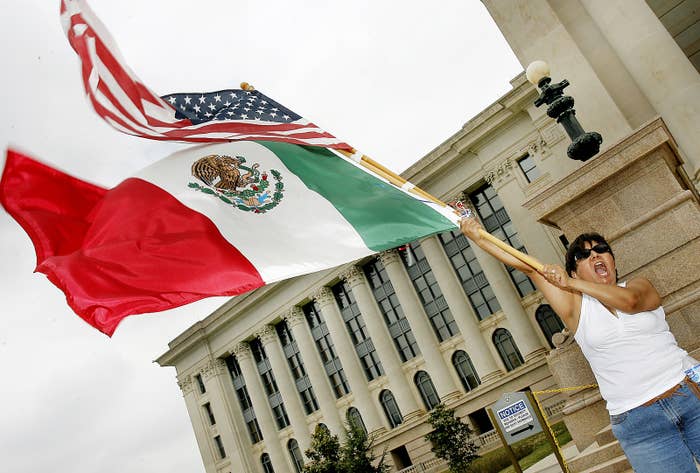
The Texas State Board of Education voted unanimously Friday to reject a Mexican-American studies textbook heavily criticized as depicting Latinos as lazy and unpatriotic.
The book, Mexican American Heritage, included passages that said “Chicanos, on the other hand, adopted a revolutionary narrative that opposed Western civilization and wanted to destroy this society,” and, “Stereotypically, Mexicans were viewed as lazy compared to European or American workers.”
The board voted 15-0 to reject the book.
“This textbook was so plagued with factual errors and offensive stereotypes that it was irredeemable,” said Celina Moreno, legislative staff attorney with the Mexican American Legal Defense and Educational Fund (MALDEF). “Today was a resounding victory.”
In light of Donald Trump’s election last week and how divided the US currently is, it’s important to honor everyone’s history, Moreno added. MALDEF was one of the groups that formed a coalition to stop the book from being approved.
“The textbook before the state board of education distorted and omitted the contributions of Mexican-Americans and others,” Moreno said. “As Americans, we can’t spread ignorance in our textbooks and then feign shock when we see anti-Latino and anti-immigrant bullying and intimidation.”
#Texas #Education Board Says No to #MexicanAmerican Studies Textbook https://t.co/BIICqZNTU3 #SBOE #Latinos
In September, Cynthia Dunbar, a former Republican member of the education board who now heads the educational curriculum company that produced the textbook, told the Texas Tribune that criticisms had been overblown and most were based on a draft copy that her company has since revised.
“We have absolutely no desire to do anything that's offensive to the Mexican-American community,” Dunbar told the newspaper. "The way that I see it, is a lot of these allegations are slanderous, libelous, and defamatory statements that do not represent the content that's in the book."
On Wednesday, the board took a 14-0 preliminary vote against the book so the decision on Friday decision was expected. The board also agreed to give publishers more time to submit textbooks for ethnic studies to be considered next year.
Another passage in the book that upset activists and scholars said “[M]exican laborers were not reared to put in a full day’s work so vigorously. There was a cultural attitude of ‘mañana,’ or ‘tomorrow,’ when it came to high-gear production. It was also traditional to skip work on Mondays, and drinking on the job could be a problem. The result was that Mexican laborers were seen as inferior and kept in low-paying, unskilled jobs that did not provide a pathway upward.”
It also said that illegal immigration caused “poverty, non-assimilation, drugs, crime, and exploitation.”
Mexican American Heritage was the only book submitted for Mexican-American high school social studies electives. Even if it had been approved, schools in Texas would not have been required to use it.
“I hope this sends a strong message to everyone, that even in the red state of Texas, they agree that we need to face up to our entire history,” said Thomas Saenz, president and general counsel of MALDEF. “Especially those times when this country was less than true to its constitutional principles with respect to minority communities.”
Scholars say a publisher responded to errors in its Mexican-American studies textbook with… more errors… https://t.co/iAMo2CeCmy
Tony Díaz, a Houston-based writer and a leader of the The Librotraficante, or “book trafficker,” movement launched in response to Arizona’s prohibition of Mexican-American studies, said the board's decision was powerful and encouraging.
“To get an A, students would’ve had to say that there was no formal education in Mesoamerica and that our community is lazy,” Díaz said. “If there are no Chicano or Latinos in the classroom, students would’ve thought that that was true and these folks would’ve gone on to create policies that affect our community with these stereotypes in mind.”
Díaz said the coalition of groups that fought the book will now work with universities and smaller publishers to present the Texas State Board of Education with accurate textbooks for Mexican-American studies.
“We have a lot of work to do,” Díaz said.
